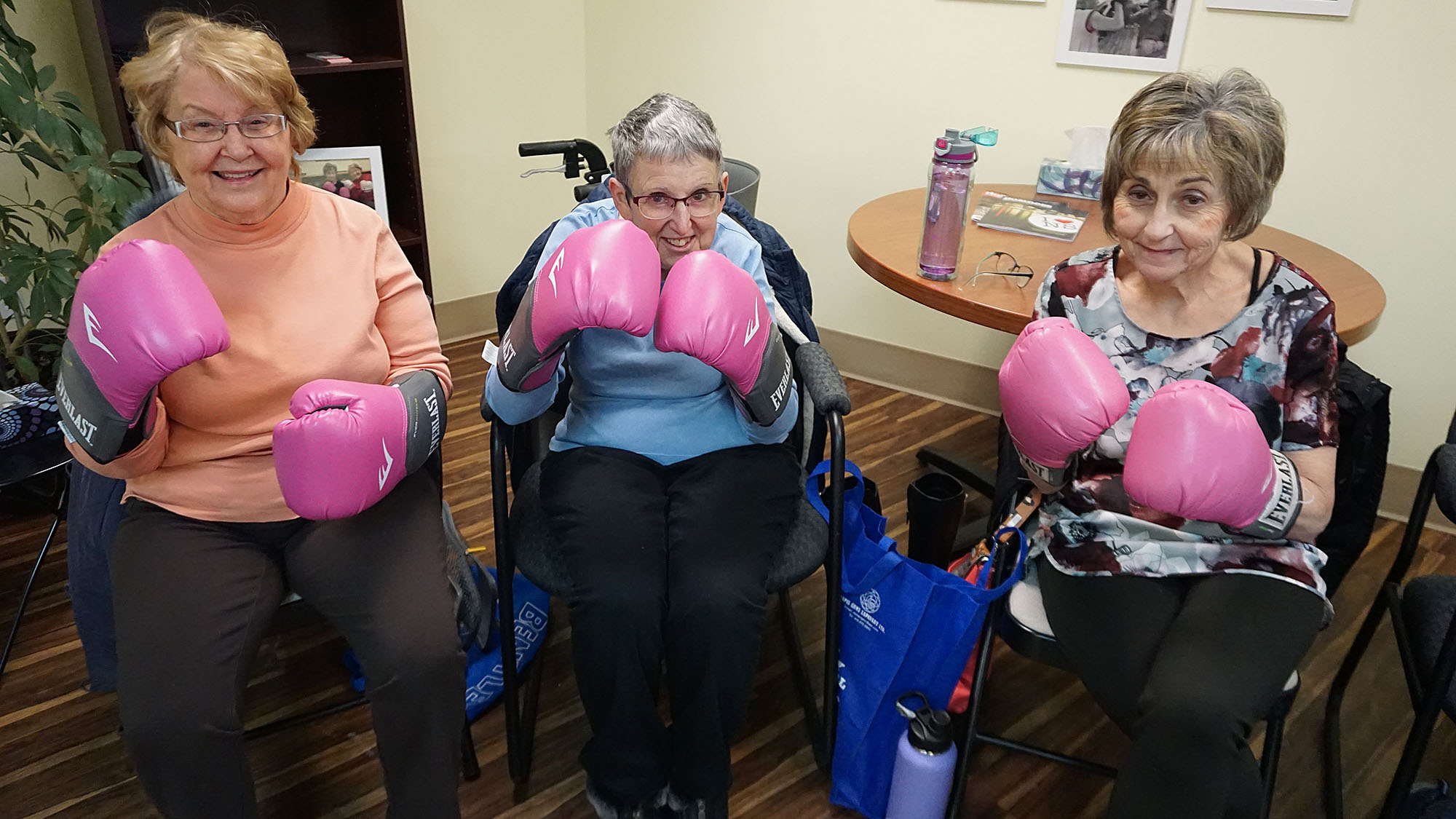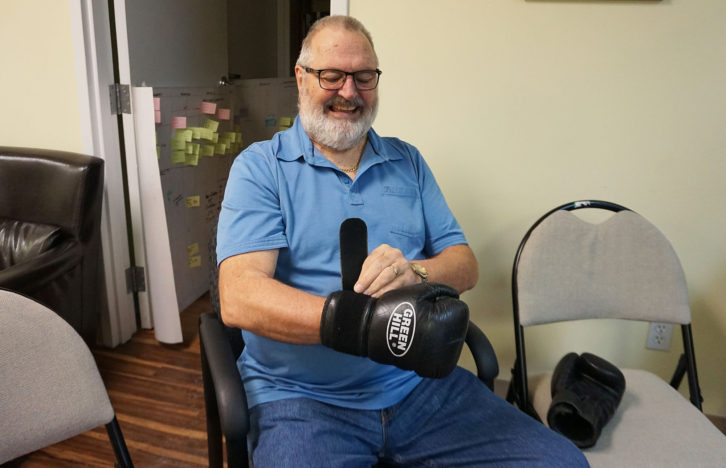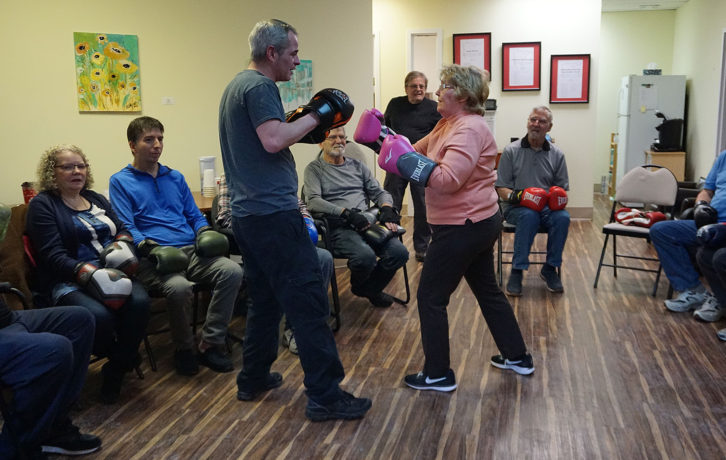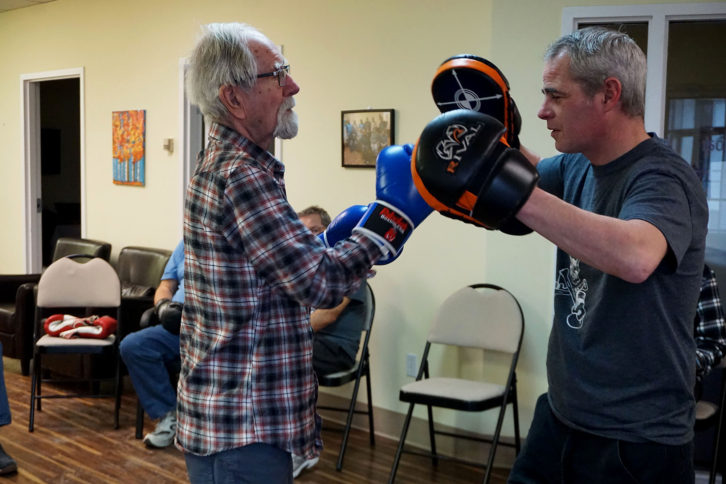How boxing is helping with more than mobility for people with Parkinson’s
The program started in June 2019 with eight regulars, now new people show up every week

caption
Mary Mclean, Connie Macmillan and Cindy Jussup show off their pink boxing gloves.It’s Wednesday afternoon and Mary Mclean laces up her pink boxing gloves before stepping into the boxing ring. In this case, the boxing ring is a small office located in the Bayers Road Centre that also serves as the Parkinson’s Canada office.
Mclean was diagnosed with Parkinson’s disease three years ago. A friend sitting next to her was diagnosed more than 20 years ago.
“Everybody is at different stages and has different symptoms,” said Mclean. “We’re the same but different.”
The boxing program for people with Parkinson’s was piloted in June 2019 and was an immediate success. It started with eight regulars throughout the summer. Now, there are new people showing up every week.
“I think part of the success is that it is activity-based, so they feel normal,” said Lisa Frankland, the community development co-ordinator at Parkinson’s Canada. “The rate of retention in participants is extremely high with the boxing program.”
There are usually 10 to 12 people at the boxing class each week, although they now have about 20 on the roster.
As the participants wait for the coach to arrive, they help each other wrap their hands and put on their gloves.

caption
Brian Richards gets geared up to step in to the ring.Ask any of the participants what they love about boxing and most of them will mention their coach.
Aaron Kinch started as a volunteer and now receives a small stipend that covers gas for his hour-long commute from Truro every week.
Kinch was a professional boxer until 10 years ago when he was forced to retire after a workplace accident left him with a broken spine. After the injury he started coaching and opened a boxing gym in Westville that’s free for children.
“I know what it’s like to be down and out,” said Kinch. “But people can do it, it doesn’t matter who you are or what your ailment is, you can find a way if you want to.”
Kinch has volunteered his whole life, and since his injury he said he’s increased his volunteer work.
“I’ve had more time to help out people who are essentially in worse situations than I’m in,” said Kinch. “Anybody who needs help, I want to help them.”
There is plenty of banter as Kinch makes his way around the ring that is set up with chairs.
“Go get him,” someone shouts out as their neighbour steps into the ring.

caption
Mary Mclean practising her uppercuts with coach Aaron Kinch.There are nine different support groups run by Parkinson’s Canada in Nova Scotia, but this activity-based group is one of the most unique and successful.
“The hand-eye co-ordination is massive,” said Kinch. “You have these folks come in and their hands are shaking and their legs are shaking and they don’t feel like they can do much, but then they start working and the change in the hand-eye co-ordination and their balance and stability is just unbelievable.”
Kinch said seeing the improvements in the individuals is the reason he will keep coming back.
“It’s a good time. It’s like a family. I’m not kidding. People helping each other in every way they can,” said Kinch.

caption
Randy Skaling takes his turn boxing with coach Aaron Kinch.The boxing classes do much more than improve balance, stability and hand-eye co-ordination. They also improve confidence and motivation.
Brian Richards has been attending the boxing classes for 10 weeks. His favourite part is the friendships he’s forged.
“It lets you know you’re not alone,” he said.
Another boxing class attendee, Wade Antonowicz, said he really enjoys the camaraderie of the boxing classes.
“I like getting to know the people who are having the same problems as I am,” he said.
About the author
Ellen Riopelle
Ellen is a journalist currently living in Halifax. She has a penchant for travelling, hammocks, craft beer and good stories.

L
Lisa Frankland